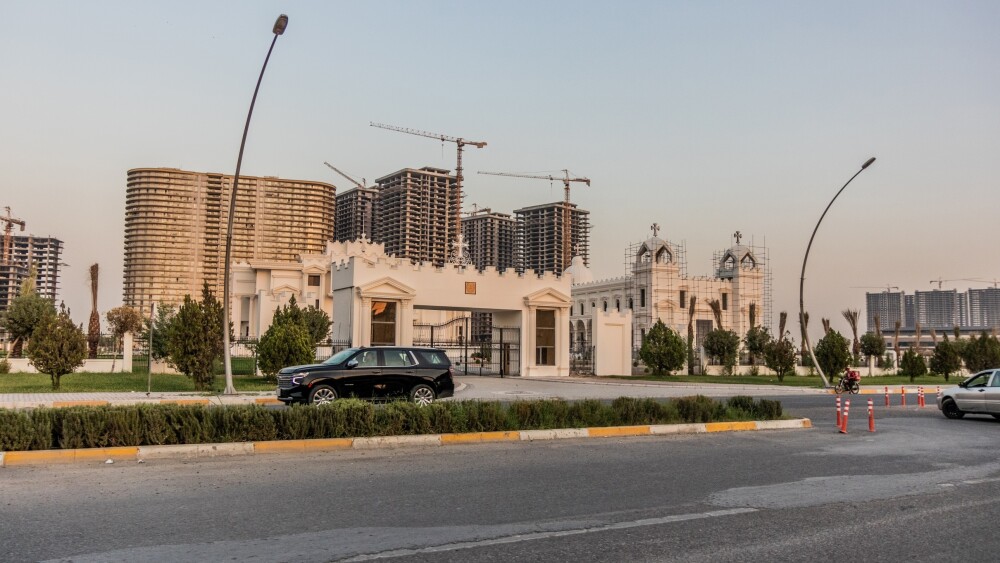Since 2003, U.S. policy in Iraq has favored the Kurdistan Regional Government in Erbil under the assumption that it is a pro-American, pro-democracy force in the region. Yet for the Assyrian people—indigenous Christians of northern Iraq—this support has translated into dispossession, displacement, and cultural erasure. With its unconditional backing of the Kurdish parties, Washington has empowered an ethno-nationalist project that marginalized an indigenous people and replicated the principle of oppression the U.S. claims to oppose.
The Assyrian population in northern Iraq has declined, not just due to Islamist violence, but also because of systematic political and territorial encroachment by the Kurds. Since the 1960s, Kurdish authorities have annexed Assyrian villages, manipulated demographics, and denied land rights. This continued even after the fall of Iraqi President Saddam Hussein. In areas and towns such as Ankawa, Dohuk, and Nahla Valley, Assyrians report intimidation and land confiscation—often backed by forces loyal to Kurdish parties.
Since the 1960s, Kurdish authorities have annexed Assyrian villages, manipulated demographics, and denied land rights.
In 2014, as the Islamic State advanced toward the Nineveh Plain, the Kurdish peshmerga militia disarmed local Assyrian defense units and pledged to protect the civilian population. Then, on the night of the Islamic State attack, the peshmerga withdrew without warning, leaving dozens of towns defenseless. This abandonment forced hundreds of thousands of Assyrians to flee, many permanently.
The slow-motion erasure has unfolded with the tacit approval—and often material support—of the United States. Billions of dollars in military and political aid have flowed to the Kurdistan Regional Government despite its authoritarian tendencies, corruption, and use of terror tactics against the original inhabitants. The same international coalition that rallied to defeat the Islamic State has allowed the post-Islamic State power vacuum to be filled by other actors hostile to the indigenous non-Muslim communities of Iraq.
The irony is that the Kurdistan Regional Government markets itself as a haven for persecuted minorities. Kurdish authorities showcase Assyrians, Yazidis, and others to enhance the image of Kurdish tolerance. The people paraded as evidence of Kurdish benevolence are, in reality, denied property rights, excluded from governance, and reduced to token minorities in their own homeland.
More troubling is that the Kurdistan Regional Government increasingly employs individuals from within the Assyrian community—through symbolic appointments, ceremonial roles, or selected spokespeople to present a false image of inclusion. The Kurdistan Regional Government, for example, recently invited two Assyrian activists from the United States to whitewash the regime’s policies and create an illusion of consensus. While they appear on various forums to praise the Kurdistan Regional Government, the broader Assyrian population remains displaced, disenfranchised, and marginalized.
Reality, however, is damning. Since the 1960s, the Kurds have seized hundreds of thousands of acres of Assyrian lands—despite documented ownership deeds. The most egregious example is the land on which Kurds built the Erbil International Airport, which they expropriated from Assyrian owners without compensation. Kurdish authorities have renamed many villages with Kurdish names in a systematic effort to entrench Kurdish control and erase Assyrian presence.
The Assyrians are a natural U.S. ally. They are pro-Western, democratic, and pluralistic.
In September 2018, the head of the Assyria Patriotic Movement met with State Department officials and provided them with a detailed report on properties occupied by Kurds for decades. And in 2023-2024, “United for Assyria,” an affiliate of the Assyria Patriotic Movement, organized four protests against the U.S. pro-Kurdish policy. Still, the State Department continues to defer much of its policy to the Kurdistan Regional Government.
Washington should reconsider its approach. Backing the Kurdistan Regional Government at the expense of the indigenous Assyrians is morally indefensible and strategically short-sighted. The Assyrians are a natural U.S. ally. They are pro-Western, democratic, and pluralistic. The survival of the indigenous Assyrians aligns with the interests of the United States and its allies, including Israel, which also faces threats from the same axis of Islamist extremism and authoritarian regional blocs.
Instead of enabling Kurdish domination, U.S. policy should support the establishment of an autonomous Assyrian region in the Assyrian Triangle—including the Nerwa-Rekan region—governed by its own people, protected by its own security forces, and integrated into Iraq’s federal system under Article 119 of the Iraqi constitution. This is not a fantasy. The Kurdish Regional Government itself was established through a similar process in the 1990s, backed by no-fly zones and legal mechanisms that transformed de facto control into formal autonomy.
By shifting support toward Assyrian autonomy, Washington has the chance to correct a long-standing injustice, reinforce regional pluralism, and gain a loyal, strategic partner in a region where true allies are rare.





